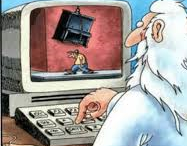
Does Education Jeopardize Faith?
I recently read an online article from the publication, desiringgod.com, based on research by the Pew Research Center that reports that “roughly 70 percent of high school students who enter college as professing Christians will leave with little to no faith.”
Yikes! Does that mean that education is a danger to faith? The short answer, in my opinion, is no, at least if the religious student is prepared and the higher education is provided in an objective manner. And, not to encourage conspiracy theorists, I hope objectivity is still a value in higher education.
Another article in the same publication quoted a Pew finding that asked the rhetorical question, “What was the word that many of the respondents used to explain their lack of belief?” The most common answer: “Science!”
Learning About Evolution
Here are some of the specific factors young people who participated in the study provided about their loss of faith: (1) “Learning about evolution when I went away to college.” (2) “Rational thought makes religion go out the window.” (3) “Lack of any sort of scientific or specific evidence of a creator.”
One of the problems, as I see it, is inadequate religious education before entering college. Studies show that that education – learning about God and humans’ relationship with God – pretty well ceases in the pre-teen and teen years as more education about secular matters continues.
Study of religion, and religions, is difficult because God is unknowable and human explanations about God and religion are complex. And few teachers are equipped to teach religion in an interesting and engaging way.
Students tune religion out at a relatively early age and miss much of what would be valuable as they learn about science in college. Faith has reasonable and understandable answers to the problems cited by youth who have abandoned their faith in college.
Genesis Among Biggest Obstacles
First, when both are understood, there is no conflict between evolution and the Bible. One of the biggest obstacles to understanding the Bible, according to the polls, is the Book of Genesis and its creation stories. Science itself has done the most to help us understand Genesis but many young people are taught to take as history what is not history but valuable religious teaching about God as creator.
Second, faith – unlike what many believe and are taught – is rational. It’s based on revelation from ancient writings – most of which are scientifically shown to be genuine – from philosophical reasoning and the witness of millions of people over centuries.
Third, the evidence for God as creator may not be satisfactory to some among professors of scientific subjects, but it is for many others among their number. The majority of scientific discoveries in the past several hundred years were made by people of faith and many contemporary scientists – including Francis Collins, one of America’s foremost scientist and former head of the Human Genome Project – are believers.
Not Hearing, or Listening
Fact is, young people are not hearing, or listening to, these messages.
Don’t get me wrong. Faith, especially in today’s climate of opinion, is not easy to come by or maintain and the findings about people losing their faith in college are not surprising.
But I can’t leave this subject without mentioning what I believe is an elephant in the room: bias against religion and believers among university teachers.
An article in the online publication, The Conversation, is titled, “The Challenges of Being a Religious Scientist” by Christopher Scheitle, who teaches at West Virginia University.
He wrote that “…religious people do face challenges when working in science. These challenges have little to do with internal struggles over stereotypical issues like the origins of human life. Instead, religious scientists more often report navigating hostility from their peers….”
When it comes to their faith, young people have a hard row to hoe.




